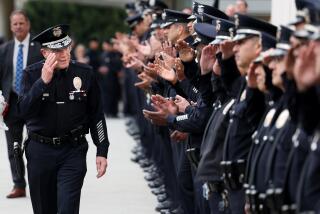No More Mr. Bad Guy
- Share via
NEW YORK — Leo F. Mullin, the new chief executive at Delta Air Lines Inc., embodies a surprising trend in American business: the cult of the Good Boss--the manager who believes that happy employees and corporate profits go hand in hand.
Mullin’s predecessor as CEO, Ronald W. Allen, was regarded by Delta employees as an example of the sort of ruthless manager who put the “down” in downsizing during the early 1990s. Allen slashed thousands of jobs from the Atlanta-based carrier’s roster and made the once-ailing carrier profitable again--music to any board member’s ears.
Allen was also known as an autocratic boss who didn’t mind humiliating employees who displeased him. And his tenure had shredded the loyalty and exuberance of employees who had once been so proud to work for Delta that they bought a Boeing 767 and called it “The Spirit of Delta.” As employee morale crashed, customer complaints climbed.
So when Delta’s board of directors decided it was time for a new CEO, they went looking for a leader who would “be a great listener and capture the imagination of Delta employees,” said Dayton Ogden, president of SpencerStuart Inc., the executive search firm Delta hired. “People skills were very important to them.”
Mullin had gained a reputation for nurturing employees at Chicago-based Commonwealth Edison, where he was vice chairman until mid-August. He was known for his early-morning visits to employees at work sites throughout the company’s service area, far from the executive offices.
Those “feel-good” people skills made Mullin the right person for Delta. And they illustrate a broader trend that’s taking place across corporate America as a reaction to the “lean and mean” years begins to set in.
As companies downsized during the last decade, managerial macho swept the corporate world. Boards of directors wanted CEOs who would have no trouble firing and demoting longtime employees and asking those left behind to do more work for the same money. Fear and depression swept through the business world. Albert J. “Chain Saw Al” Dunlap--a corporate rescue artist who fired thousands of people at Sunbeam Corp. and Scott Paper Co. and was proud of it--became the poster boy for the downsizing movement.
Now, many management consultants and executive search specialists believe that the despotic, command-and-control bosses with egos as impenetrable as Fort Knox may be in retreat.
“I think the pendulum is starting to swing toward more humane, more sensitive bosses,” said James B. Miller, a former CEO and author of “Best Boss, Worst Boss.”
“There still are very mean, Machiavellian managers, but there is a trend away from that,” said Roger I. Sekera, managing director of the Washington office of A.T. Kearney Executive Search.
CEOs such as Dunlap, Robert L. Crandall of American Airlines Inc. and Robert E. Allen at AT&T; Corp. were frequently named as executives who, as Sekera put it, “fight like hungry tigers--and they’re proud of it. . . . Forced into survival mode, people will do very vicious things that cut to the core. And they don’t care.”
Allen at AT&T; is known as a cold executive who seldom interacted with people outside the executive suite. In times of trouble, AT&T; employees have been known to quip: “Bob Allen wouldn’t let that happen if he were alive.”
In late 1995, Allen told the company’s 300,000 employees via satellite not to worry about rumors of layoffs. “No one should get their stomach in a knot over press stories about massive layoffs,” he said.
Four months later, on the first workday of 1996, he announced that the company would lay off 40,000 employees over three years. Shortly after that, it was disclosed that the AT&T; board was giving Allen $6 million in salary and stock options that could be worth $10 million for his leadership in splitting up the company. (The stock options are currently worthless because the price of the company’s stock has declined.)
But boards--and some CEOs--have begun to recognize the down side of downsizing and its after-effects. With a booming economy, low unemployment and great demand for highly skilled workers, companies are now struggling to keep good employees. And some have discovered that--amazingly enough--loyalty to the firm increases if employees believe they’re treated well.
“We are in a performance-based hiring climate,” said Sekera. “Everybody wants the best of the best, so you have to be sensitive to people’s needs. If you aren’t, you won’t get them. Or keep them.”
Allen was often mentioned by analysts as a less-than-stellar CEO for his fumbling of the AT&T; downsizing and, this year, for the hiring--and firing--of his successor, John R. Walter. At the same time, Henry Schacht, Allen’s counterpart at the AT&T; spinoff Lucent Technologies Inc., was cited by management experts as an example of a bold CEO who values loyalty and teamwork.
If Allen had a tough job, Schacht, former chairman of Cummins Engine Co., had a tougher one. Of the 40,000 AT&T; layoffs, 23,000 were to come from Lucent, an equipment maker with annual revenue of $21 billion. Schacht offered to co-manage the company with Richard McGinn, the president of Lucent and the man many expected to get the CEO job, and was able to lure many executives away from AT&T.;
Schacht called companywide meetings to ensure employees that working for Lucent would be “the chance of a lifetime,” closed down the executive dining room so that he and other top managers could eat cafeteria-style with staffers and gave every worker at the company a chance to buy 100 shares of Lucent at $44.56 a share (it’s now trading at about $80 a share) so they would feel they were owners of the company.
Executive searcher Sekera said boards that once cared only about an executive’s background and attention to the bottom line are finally becoming more concerned about whether the CEO they’re hiring can get along with people.
As an example, he cites a search conducted about a year ago by a fast-growing company. Sekera found a very well-known and successful executive who was interested in the job. The founder of the company wanted to hire him, but the board said no.
“They thought he was too rough a cob, too brusque, too used to having his own way,” said Sekera.
“The guy they hired was probably just as tough, but had a much softer exterior.”
“Sadly, employee abuse is ascending, while their loyalty is in decline,” said Harvey Hornstein, an organizational psychologist at Teacher’s College in New York.
One of the reasons U.S. companies have put up with ugly bosses for so long is that it’s tough to measure the costs of brutal and abusive bosses, experts said. The price shows up in greater incidence of illness, anxiety and depression, lower productivity and higher turnover.
More to Read
Inside the business of entertainment
The Wide Shot brings you news, analysis and insights on everything from streaming wars to production — and what it all means for the future.
You may occasionally receive promotional content from the Los Angeles Times.










